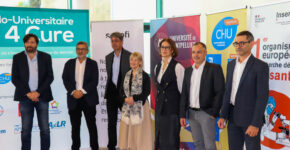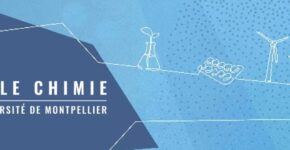Pôle Sciences sociales (Soc)
Le Pôle de Recherche Sciences Sociales de l’Université de Montpellier constitue un espace d’animation et de mise en synergie de structures et acteurs de la recherche, en droit et science politique, économie, éducation et gestion, présents à Montpellier.
Gouvernance du pôle
- Directrice du Pôle Sciences Sociales : Irène Georgescu
- Chargée d’administration et d’aide au pilotage : Corine Delesalle
- Responsable de la Commission « Ressources Humaines » Droit et Science Politique : Pascale Idoux
- Responsable de la Commission « Ressources Humaines » Economie : Guillaume Cheikbossian
- Responsable de la Commission « Ressources Humaines » Education : Sylvain Wagnon
- Responsable de la Commission « Ressources Humaines » Gestion : Jean-Marie Courrent
Conseil de pôle
Le Conseil de Pôle rend des avis consultatifs sur l’orientation et la mise en œuvre des actions et de la stratégie du Pôle.
Comité d’orientation stratégique (COS)
Le Comité d’Orientation Stratégique assure un lien entre le Pôle de Recherche et les partenaires institutionnels. Il participe à la définition des grandes orientations stratégiques en matière scientifique du Pôle de Recherche et se prononce sur le plan d’actions proposé par la direction du Pôle de Recherche.
Commission ressources humaines (CRH)
Le Pôle comprend 4 Commissions « Ressources Humaines » (CRH).
Les Commissions « Ressources Humaines » traitent des questions spécifiques aux personnels de l’Université de Montpellier. Chaque Commission « Ressources Humaines » émet un avis consultatif, dans le respect des dispositions statutaires spécifiques au corps des enseignants-chercheurs et chercheurs.
Chiffres clés
- 21 Laboratoires en Sciences Sociales
- 5 Etablissements partenaires
- 2 Unités d’Appui et de Recherche (UAR)
- 4 Écoles doctorales
- 2 Projets Thématiques Longs (PTL)
Missions
- animer, communiquer au sein du pôle, dégager une prospective scientifique ;
- faciliter et coordonner des réponses à des appels à projets transversaux territoriaux, nationaux ou internationaux ;
- participer au rayonnement national et international des recherches, actions et résultats de la communauté Sciences Sociales ;
- faire l’interface entre formation et recherche ;
- par le biais de ses 4 commissions RH, traiter des questions spécifiques aux ressources humaines des personnels de l’Université de Montpellier.
Périmètre scientifique
Le pôle Sciences Sociales rassemble 21 unités de recherche en droit et science politique, économie, éducation et gestion, présentes à Montpellier et s’appuie sur :
- 5 établissements partenaires de l’Université de Montpellier impliqués dans le Pôle de Recherche Sciences Sociales (CIRAD, CNRS, INRAE, IRD et Institut Agro) ;itut Agro) ;
- 2 Unités d’Appui et de Recherche (UAR) : la MSH SUD (Maison des Sciences de l’Homme SUD) et l’ISDM (Institut de Science des Données de Montpellier) ;
- 4 écoles doctorales : DSP (Droit et Science Politique), EDEG (Économie et Gestion), LLCC (Langues, Littératures, Cultures et Civilisations), TTSD (Territoire, Temps, Sociétés et Développement) ;
- 2 Projets Thématiques Longs (PTL) : “Entrepreneuriat, innovation, soutenabilité” (EIS) et “Transitions Gouvernance Société” (TGS) ;
- 10 Unités de Formation et de Recherche (UFR), Écoles et Instituts de l’Université de Montpellier en lien avec le Pôle de Recherche Sciences Sociales.
Structures de recherche
- Acteurs, Ressources et Territoires dans le DEVeloppement (ART-Dev)
- Centre d’Economie de l’Environnement – Montpellier (CEE-M)
- Centre d’Études et de Recherches Comparatives Constitutionnelles et Politiques (CERCOP)
- Centre d’Etudes Politiques Et sociaLes : Environnement, Santé, Territoires (CEPEL)
- Centre de recherches et d’études administratives de Montpellier (CREAM)
- Centre du Droit de l’Entreprise (CDE)
- Ecole de droit social de Montpellier (EDSM)
- Équipe de Droit Pénal et de sciences Forensiques de Montpellier (EDPFM)
- Institut d’Histoire du Droit Edmond Meynial (IHD)
- Institut de Droit Européen des Droits de l’Homme (IDEDH)
- Laboratoire de droit privé (LDP)
- Laboratoire Innovation Communication et Marché (LICeM)
- Laboratoire interdisciplinaire de recherches en didactique, éducation, formation (LIRDEF)
- Montpellier Recherche en Économie (MRE)
- Montpellier Recherche en Management (MRM)
- Santé, éducation et situations de handicap (SANTeSiH)
Structures de recherche en partenariat :
- Gestion de l’Eau, Acteurs, Usage (G-EAU)
- Innovation et développement dans l’agriculture et l’alimentation (INNOVATION)
- Marchés, Organisations, Institutions et Stratégies d’Acteurs (MOISA)
- Savoirs, Environnement, Sociétés (SENS)
- Recherches translationnelles sur le VIH et les Maladies Infectieuses endémiques et émergentes (TransVIHMI)




